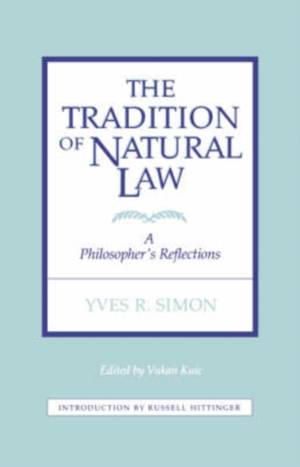
- Retrait gratuit dans votre magasin Club
- 7.000.000 titres dans notre catalogue
- Payer en toute sécurité
- Toujours un magasin près de chez vous
- Retrait gratuit dans votre magasin Club
- 7.000.0000 titres dans notre catalogue
- Payer en toute sécurité
- Toujours un magasin près de chez vous
Tradition of Natural Law
A Philosopher's Reflections
Vukan Kuic, Yves R Simon
Livre broché | Anglais
56,45 €
+ 112 points
Description
Available in a new digital edition with reflowable text suitable for e-readers
The tradition of natural law is one of the foundations of Western civilization. At its heart is the conviction that there is an objective and universal justice which transcends humanity's particular expressions of justice. It asserts that there are certain ways of behaving which are appropriate to humanity simply by virtue of the fact that we are all human beings. Recent political debates indicate that it is not a tradition that has gone unchallenged: in fact, the opposition is as old as the tradition itself. By distinguishing between philosophy and ideology, by recalling the historical adventures of natural law, and by reviewing the theoretical problems involved in the doctrine, Simon clarifies much of the confusion surrounding this perennial debate. He tackles the questions raised by the application of natural law with skill and honesty as he faces the difficulties of the subject. Simon warns against undue optimism in a revival of interest in natural law and insists that the study of natural law beings with the analysis of "the law of the land." He writes not as a polemicist but as a philosopher, and he writes of natural law with the same force, conciseness, lucidity and simplicity which have distinguished all his other works.Spécifications
Parties prenantes
- Auteur(s) :
- Editeur:
Contenu
- Nombre de pages :
- 194
- Langue:
- Anglais
Caractéristiques
- EAN:
- 9780823206414
- Date de parution :
- 01-01-99
- Format:
- Livre broché
- Format numérique:
- Trade paperback (VS)
- Dimensions :
- 140 mm x 213 mm
- Poids :
- 272 g

Les avis
Nous publions uniquement les avis qui respectent les conditions requises. Consultez nos conditions pour les avis.






